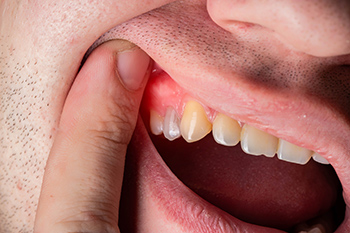An abscessed tooth, also referred to as a dental abscess, is a pocket of pus that forms due to a bacterial infection. It can cause moderate to severe pain that may radiate into your ear or neck. If left untreated, an abscess can turn into a severe, life-threatening condition.
There are three different types of abscess, depending on where it is located:
- Periapical: located at the tip of the tooth’s root
- Periodontal: located on the bum next to the root of the tooth, may spread into the surrounding tissue and bone
- Gingival: located on the gums
In this article, we’ll explain more about the common causes and symptoms of dental abscess, how it is diagnosed, and the options for treatment.
What Causes an Abscessed Tooth?
When bacteria gets into your teeth or gums, you may develop a dental abscess. However, this depends on the type of dental abscess:
- Periapical: bacteria gets into the tooth’s pulp, which is made up of nerves, blood vessels, and connective tissue.
- Periodontal: typically caused by gum disease, but may also be due to trauma/injury
- Gingival: a foreign body gets embedded into your gums
What are the Common Symptoms of an Abscessed Tooth?

You may also notice:
- Swollen/puffy gums
- Fever
- Redness
- Swollen lymph nodes
- Difficulty breathing/swallowing
- Foul taste/odor
- Sensitivity to hot/cold
If you have a fever accompanied by swelling, and difficulty breathing or swallowing, you should go to the emergency room. These symptoms indicate that the infection may have spread to other areas of your body.
Diagnosing an Abscessed Tooth
A dental abscess will not resolve without intervention. Therefore, if you have any of the above symptoms, it’s important to visit a dentist right away. If you do not receive a diagnosis and treatment, the infection may spread to other parts of your head, neck, and even into other parts of your body. If you have a weakened immune system due to a health condition, certain medications, or medical treatments.
In order to determine if you have an abscess, the dentist will:
- Tap on teeth- an abscessed tooth will hurt
- Take x-rays- this will determine if the infection has spread
If the dentist is unable to diagnose an abscess on their own, they may send you to a specialist, such as an endodontist. They have special training that helps them diagnose and treat issues such as this.
How is an Abscessed Tooth Treated?
The primary goal of treatment is to get rid of the infection. There are several options for treatment.
Antibiotics: if the infection has spread, the dentist will likely give you an antibiotic. This does not cure the abscess itself but will help get rid of the infection.
Root canal: this is the most common way to treat a dental abscess. This procedure involves removing the infected tooth pulp and filling the empty tooth chamber with a biocompatible material. The tooth will then be sealed with a dental filling or covered with a dental crown.
Extraction: if the tooth cannot be salvaged, the dentist will recommend extraction.
Surgery: in some cases, you may need surgery to drain the abscess.
If your abscess ruptures, the pain will stop. However, it’s still critical to seek appropriate treatment. You will be given specific aftercare instructions to follow after treatment.
Tips for Preventing an Abscessed Tooth
There are several things you can do to keep your teeth and gums healthy, including:
- Visiting the dentist every 6 months for an exam and cleaning
- Brush teeth twice daily with fluoride toothpaste
- Floss at least once daily
- If you have a tooth that is loose or cracked/broken, seek treatment right away
- Limit snacking between meals
- Limit sugary foods/beverages, as these can cause cavities which can lead to an abscess
Potential Complications of Tooth Abscess
The primary complication of not seeking prompt treatment of a dental abscess is that the infection may spread. This can cause a variety of other oral and overall health issues. If left untreated for too long, the infection could cause death.
Do You Have an Abscessed Tooth?
If you're experiencing an abscessed tooth, don't hesitate to schedule a consultation appointment with Arlington Dental Excellence in Arlington, Virginia. Our experienced dentists will conduct a thorough examination, which may include x-rays, to accurately diagnose the condition of your tooth. Based on the extent of the infection, we will suggest the most suitable treatment option to address the issue and prevent further spread of the infection.




